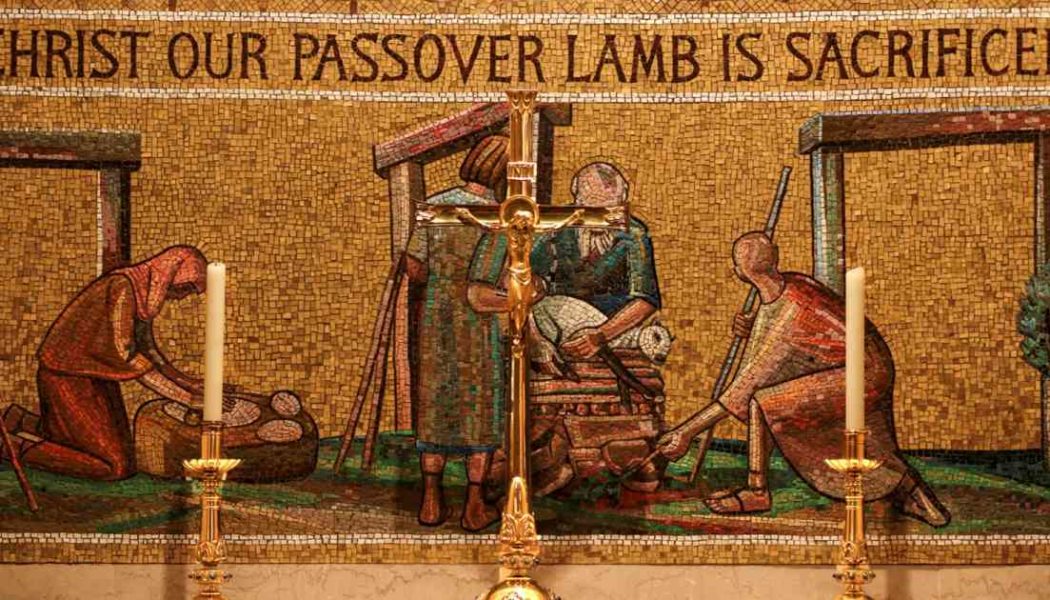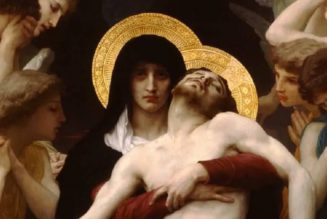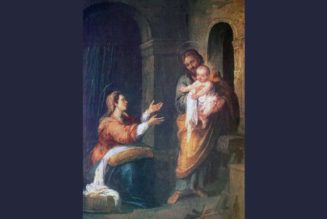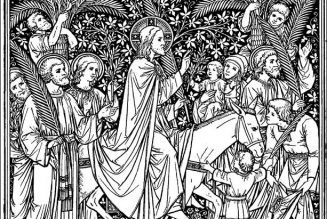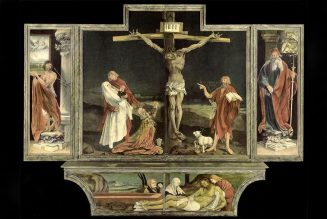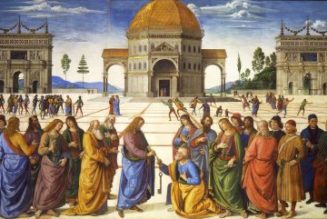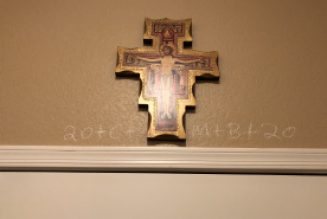
Why is Jesus asking us to eat his flesh? Why would he want that? That’s the big question on the 20th Sunday of Ordinary Time, Year B.
Jesus has been leading his own Eucharistic Congress — five Sunday Gospels from the sixth chapter of the Gospel of John that this year came, providentially, in the Sundays that followed the National Eucharistic Congress.
So far, we’ve covered the miracles, the manna, and the holy bread from Melchizedek to the Maccabees. In the fourth of the five Sundays, it all comes together in the most significant “offering and eating” event of the Old Testament: The Passover.
But before we go there, let’s ask the question: Why does God want to associate himself with our “eating” to start with?
This is a key question; perhaps the key question. In this Sunday’s Gospel, Jesus says things that shock his audience, things that most Protestants dismiss as symbolic, and things that, if we’re honest, are a surprise to us, too.
- He says: “Unless you eat the flesh of the Son of man and drink his blood, you do not have life within you.”
- He says, “My flesh is true food and my blood is true drink.”
- He says, “the one who feeds on me will have life because of me.”
These words simultaneously show why some Christians badly want to make this language symbolic and why they really can’t. Jesus is so very clear here that the Christians from the time of St. Paul to the vast majority today have taken these words literally. Greek, Russian and other Orthodox Christians along with Coptic, Chaldean, Maronite, Roman, Syro-Malabar Christians, and more, have all always believed that the Eucharist is Jesus’s body and blood, soul and divinity, and that Jesus wants us to consume it.
But why does he want that?
The first thing to note is that this is not the first “life-changing eating” in the Bible. In the story of the Fall in Genesis, we hear:
“When the woman saw that the fruit of the tree was good for food and pleasing to the eye, and also desirable for gaining wisdom, she took some and ate it. She also gave some to her husband, who was with her, and he ate it.”
That’s the first sin of mankind — Adam and Eve look at the Tree of the Knowledge of Good and Evil and focus on their physical appetites, mixing their self-love and their desire for the infinite in a disordered way. Since we are physical and spiritual, our sin happens in a physical and spiritual way. Genesis depicts this as eating, showing how in sin we try to possess and devour what is rightly God’s.
But there was another tree in the garden that is described in the same way as this one earlier in Genesis:
“Out of the ground the Lord God made grow every tree that was delightful to look at and good for food, with the Tree of Life in the middle of the garden.”
If eating from the forbidden Tree of the Knowledge of Good and Evil is our attempt to take God’s gifts on our terms, eating from the Tree of Life is our acceptance of God’s gifts on his terms.
And his gift is life in the New Eden, eternal life, heaven; our true home.
The penalty for taking good and evil into our own hands was to be banished from that home. Ever since, we have been disjointed and out of place. This world is not enough; we want something more. We feel, somewhere out of reach, our true home awaits us, a home of unlimited beauty, inexhaustible goodness and absolute truth that satisfies our continual longing, thirsting and questioning. We long to return to Eden.
God the Father also longs to lead us back to life with him.
God wants to undo what we did in the fall. And because we are both spiritual and physical, God gives us a physical and spiritual answer.
At the beginning of salvation history, the Lord came to dine with the Patriarch Abraham and promise him a new home, and the Lord kept sending messengers sharing food, as he did with Elijah and the Bread of the Presence in his Temple. At the end of salvation history the Lord feeds John like Ezekiel in his presence, and he gives us each a foretaste of that heavenly food in the manna and the Mass.
This Sunday’s readings give us further glimpses into the Old Testament importance of “holy eating.”
The Psalm sounds like an echo of God’s original invitation to eat the good trees of the Garden of Eden in its refrain, “Taste and see the goodness of the Lord” — experience and understand God’s gifts. The First Reading from Proverbs speaks of Wisdom and her house of seven columns and her offering of food and wine. The Fathers of the Church say Wisdom is an image of Christ himself coming to live with us in his body, the Church, and giving his life to us in the seven gifts of the Holy Spirit and in the sacraments, especially the Eucharist. Earlier in Proverbs, Wisdom is compared to the Tree of Life.
Thus, God, from the beginning to the end of salvation history, is inviting us through meals to return to our true home where we can walk with him and be friends with him, and regain the innocence we gave away to sin.
In other words, God wants to give us a meal that will allow us to “pass over” from our false land of slavery to our true home of freedom.
And, of course, the Passover meal was the heavenly meal par excellence, before the Eucharist came along. They are both fruits of the Tree of life.
It is often pointed out that the Gospel of St. John does not share an account of the Last Supper. Instead, it gives us Jesus’s extended commentary on the Last Supper. After all, the Last Supper is a Passover meal, and John says at the beginning of John 6, “The Passover was at hand.”
So, John is presenting to us the words of Jesus that explain the Last Supper — or, better, he’s selecting the words of Jesus which explain the Mass. The earliest account of the Last Supper is in our earliest account of the Mass, in St. Paul’s letter to the Corinthians, one of the oldest books in the New Testament.
There, he recalls the Lord’s words, “This is my body which is for you.” Jesus first offers that formulation in John 6 when he says, “The bread which I will give is my flesh for the life of the world,” as Brant Pitre’s book Jesus and the Jewish Roots of the Eucharist spells out. In other words, Jesus’s words to the synagogue in Capernaum in the 30s A.D. align with St. Paul’s words to the Church in Corinth in the 50s A.D.
But how does any of this translate into eating the flesh of Jesus himself? Because in that same ancient letter, Paul also says, “Christ, our Passover lamb, has been sacrificed. Let us, therefore, celebrate the festival.”
In the past, the Passover delivered God’s people from slavery in Pharoah’s workcamp with the hope of the promised land. Today, Christ’s Passover delivers us from slavery to sin, Satan’s workcamp, with the hope of heaven. Christ, our Passover Lamb is what makes it possible to live the life St. Paul describes in the Second Reading this Sunday: escaping the “ignorance” of our “evil days’ and entering into the life of “wisdom” that is “filled with the Spirit.”
This means the Mass is the New Passover that makes our highest hopes possible.
Pitre’s book does a great job of revealing the full meaning of the Passover sacrifice in Egypt and how that meaning held through the yearly Passover sacrifices in the Temple in Jerusalem up to Jesus’s own time. He shows how:
- Jewish people didn’t merely remember the original Passover sacrifice each year; they participated in it.
- Jewish tradition said that the Messiah would come on the night of the Passover.
- The Passover wasn’t complete — the angel of death would not pass over them — unless the people ate the entire Passover Lamb.
The conclusion is inescapable.
- Jesus gives us the New Passover, the Mass, as a participation in his own sacrifice.
- In the Mass, Jesus, the Lamb of God, unites the manna of the messiah, the Bread of the Presence, and the Passover to offer salvation to each new generation.
- Receiving communion is our entry into the new life Christ promises — it is the the Tree of Life for the New Eden.
The Mass also makes the shocking words I listed at the outset a lot more palatable: Eating the body, blood, soul and divinity of Jesus in the Eucharist is not a gorging on blood, but a saving meal in the form of bread and wine.
The Church, the House of Wisdom has set her table and invites us to this extraordinary banquet. There is a simple way to respond to the invitation and bring it all together in prayer this Sunday at Mass. This Sunday in the communion line, tell Jesus: “Please, I want to go home.” Then, back in your pew, say, “Thank you, Lord. In you, I am home.”
But Jesus’s Eucharistic Congress is not done.
Last week I shared the first three lines of a five-line rhyme I developed to keep the themes of these weeks straight. I can now add a fourth:
1. What we give, he multiplies.
2. With his works, he testifies.
3. With his flesh, he fortifies.
4. In his Church, he sanctifies.
5. So …
That fifth line will get filled in next week, and it’s the most important, by far, for our lives of faith.
Image: The Basilica of the Immaculate Conception;
Lawrence OP Flickr.
